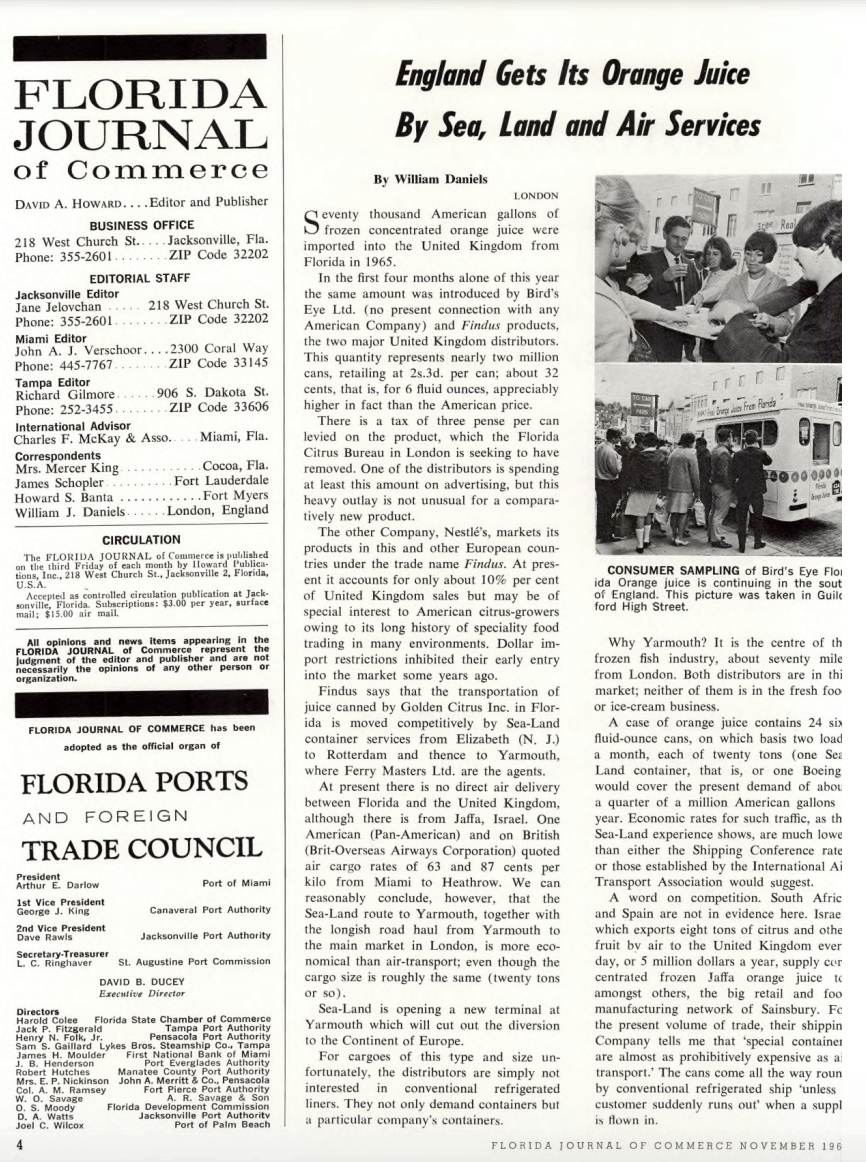The many industries that make up the world of freight have undergone tremendous change over the past several decades. Each Friday, FreightWaves explores the archives of American Shipper’s nearly 70-year-old collection of shipping and maritime publications to showcase interesting freight stories of long ago.
The following is an excerpt from the November 1966 edition of the Florida Journal of Commerce.
Seventy thousand American gallons of frozen concentrated orange juice were imported into the United Kingdom from Florida in 1965.
In the first four months alone of this year the same amount was introduced by Bird’s Eye Ltd. (no present connection with any American Company) and Findus products, the two major United Kingdom distributors. This quantity represents nearly two million cans, retailing at about 32 cents for 6 fluid ounces, appreciably higher in fact than the American price.
There is a tax of three pence per can levied on the product, which the Florida Citrus Bureau in London is seeking to have removed. One of the distributors is spending at least this amount on advertising, but this heavy outlay is not unusual for a comparatively new product.
The other Company, Nestle’s, markets its products in this and other European countries under the trade name Findus. At present it accounts for only about 10 percent of United Kingdom sales but may be of special interest to American citrus-growers owing to its long history of speciality food trading in many environments. Dollar import restrictions inhibited their early entry into the market some years ago.
Findus says that the transportation of juice canned by Golden Citrus Inc. in Florida is moved competitively by Sea-Land container services from Elizabeth, New Jersey, to Rotterdam and thence to Yarmouth, where Ferry Masters Ltd. are the agents.
At present there is no direct air delivery between Florida and the United Kingdom, although there is from Jaffa, Israel. One American (Pan-American) and one British (Brit-Overseas Airways Corporation) quoted air cargo rates of 63 and 87 cents per kilo from Miami to Heathrow. We can reasonably conclude, however, that the Sea-Land route to Yarmouth, together with the longish road haul from Yarmouth to the main market in London, is more economical than air-transport; even though the cargo size is roughly the same (twenty tons or so).
Sea-Land is opening a new terminal at Yarmouth which will cut out the diversion to the Continent of Europe.
For cargoes of this type and size unfortunately, the distributors are simply not interested in conventional refrigerated liners. They not only demand containers but a particular company’s containers.
Why Yarmouth? It is the center of the frozen fish industry, about seventy miles from London. Both distributors are in this market; neither of them is in the fresh food or ice-cream business.
A case of orange juice contains 24 six fluid-ounce cans, on which basis two loads a month, each of twenty tons (one Sea-Land container, that is, or one Boeing would cover the present demand of about a quarter of a million American gallons a year. Economic rates for such traffic, as the Sea-Land experience shows, are much lower than either the Shipping Conference rate or those established by the International Air Transport Association would suggest.
A word on competition. South Africa and Spain are not in evidence here. Israel, which exports eight tons of citrus and other fruit by air to the United Kingdom everyday, or 5 million dollars a year, supplies concentrated frozen Jaffa orange juice to amongst others, the big retail and food manufacturing network of Sainsbury. For the present volume of trade, their shipping Company tells me that ‘special containers are almost as prohibitively expensive as air transport.’ The cans come all the way around by conventional refrigerated ship ‘unless the customer suddenly runs out’ when a supply is flown in.
Dive into American Shipper’s archives:
FreightWaves Flashback: Hapag-Lloyd fleets merge
FreightWaves Flashback: Should neighboring ports actually marry?
FreightWaves Flashback: ACL Railroad obtains versatile whopper hopper












